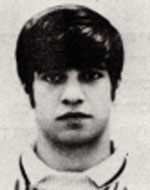Zona, Moshe
Moshe, son of Paula and Shaul, was born in 1954 in Aleppo, Syria, and immigrated to Israel with his family in August 1962. He began his studies in an elementary school in his hometown and after his family immigrated to Israel and settled in Kfar Saba, Moshe was aware of the needs of his family, many of whom faced difficulties in absorbing and adapting to the new country, and when he completed his studies he went to work to help support the family, and he gave his family all his salary and thus helped his parents and brothers improve their economic situation. , Responsible and independent in all his actions, who was endowed with great cleverness and serious and mature judgment He earned many friends and began to acquire the status of a self-employed man, who devoted his spare time to sports and especially participated in soccer competitions, he listened to music and loved to go on trips and tours in Israel. He was drafted into the IDF in early May 1972 and assigned to the Armored Corps. After basic training, he was trained to serve as a tank driver and was assigned to a unit of the armored corps in the Sinai. Thanks to his special qualities, he managed to acclimatize to the unit, acquired many friends, and was accepted by his commanders as a dedicated and disciplined soldier who fulfilled his duties in full. On the eve of the Yom Kippur War, 5734 (1974), he arrived at his home for the holiday, and expressed his confidence in the IDF’s victory and his strong belief that he would soon return to meet his family . On the second day of Cheshvan 5734 (November 2, 1973), Moshe gave up his leave and volunteered to embark on a dangerous combat mission, and was brought to eternal rest in the Kiryat Shaul cemetery, leaving behind his parents, three brothers and two sisters. In a condolence letter to the bereaved family, the commander of the unit wrote: “Our friend Moshe fell when he broke into his tank in a minefield to deliver supplies to our forces. He was our friend, who stood with us in the great battle of the Yom Kippur War and blocked the enemy’s armor in the area of the bitter lake. He served us all as a symbol of his willingness and courage. “
